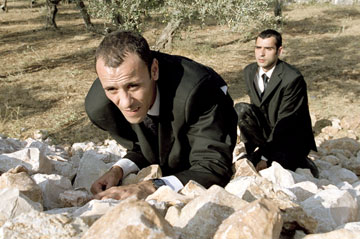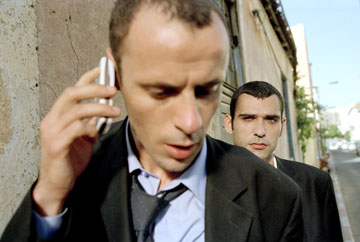Paradise Now


The image that most Westerners have of suicide bombers is that of a fanatical Muslim, sacrificing himself for his cause and/or religion. Whether or not this is the accurate view, what is clear is that many Westerners do not understand the why these people do what they do. Relations between Israeli's and Palestinians are a horrific Gordian knot of politics and religion. It is much more complex than people realize, and writer/director Hany Abu-Assad (Rana's Wedding) uses Paradise Now to show the motivations of two potential bombers without glorifying their actions. It's an interesting choice by Abu-Assad to make, especially given the volatile nature of the film's subject.
The most interesting thing that Abu-Assad and co-writers Bero Beyer and Pierre Hodgson (In the Darkness of the Night, Get a Life) do is provide context from the Palestinian point of view. Ordinary life in the West Bank town of Nablus is fraught with peril. Roadblocks make it difficult to travel, and rockets fall every once in a while. Abu-Assad tells his story through three people, friends Said (Kais Nashef), Khaled (Ali Suliman), and Suha (Lubna Azabal, Les Temps qui Changent, Viva Algeria).
Suha is the daughter of a "martyr." Her father was an advocate of violence against the Israelis. He died, achieving a legendary status amongst others who felt the same way. His death also disillusioned Suha, who viewed it as a waste. What was the point? Surely there was a better way to achieve their goals. She now works for an organization that advocates peace. At the beginning of Paradise Now, Said and Khaled seem like ordinary guys. They hang out, smoke hookah, and do whatever. They both work for a small auto shop. Khaled is a troublemaker, and Said takes an interest in Suha, who brings her car in for service.
Everything changes for these friends once they are told they were selected to carry out suicide bombings in Tel Aviv. This is a different side of the two. Life under occupation took a toll, and they are willing and eager to do something about it. They hide this fact from their families, and Said is a little dejected because he was hoping to begin something with Suha. But this was more important. Their training goes well until they make their way into Israel and are separated. At this point, with the realization of death closer, the two undergo profound changes. One becomes more determined to stay the course, the other changes his mind. While the change is moving, Abu-Assad never delves into why these men are changing their minds, particularly the former. It almost feels as if he did not want to offend one side or the other, so he gave both alternatives. This actually weakens Paradise Now a bit. It was a good thing to place everything in context. It would have been better to see the motivations behind the changed minds.